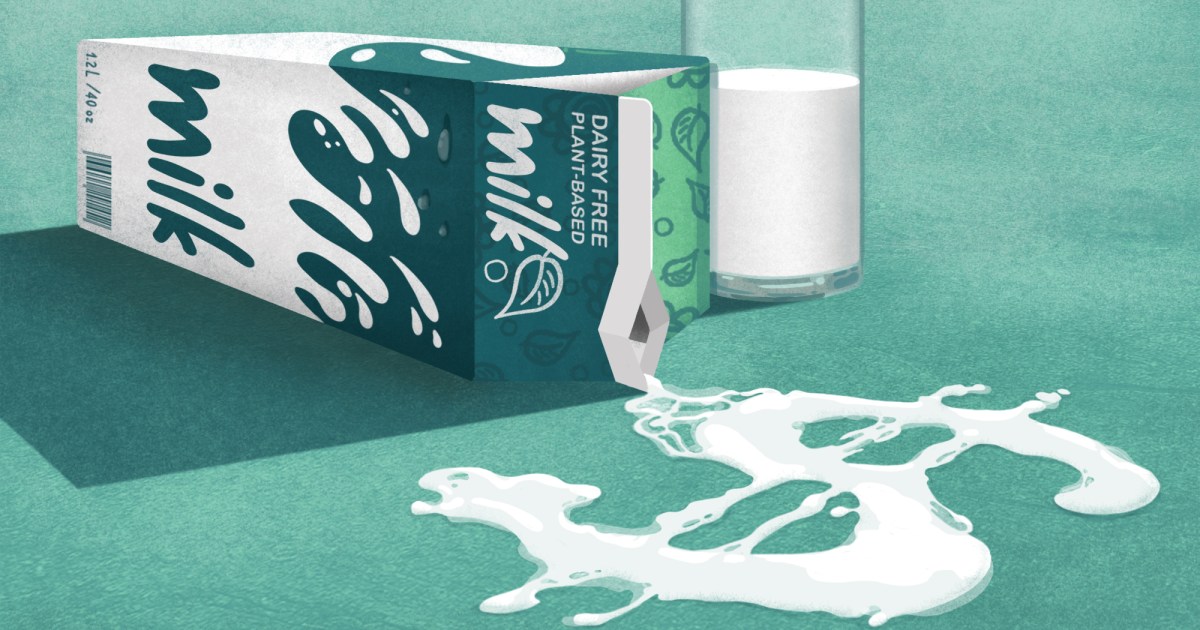Like an estimated two-thirds of the world’s population, I don’t digest lactose well, which makes the occasional latte an especially pricey proposition. So it was a pleasant surprise when, shortly after moving to San Francisco, I ordered a drink at Blue Bottle Coffee and didn’t have to ask—or pay extra—for a milk alternative. Since 2022, the once Oakland-based, now Nestlé-owned cafe chain has defaulted to oat milk, both to cut carbon emissions and because lots of its affluent-tending customers were already choosing it as their go-to.
Plant-based milks, a multibillion-dollar global market, aren’t just good for the lactose intolerant: They’re also better for the climate. Dairy cows belch a lot of methane, a greenhouse gas 25 times more potent than carbon dioxide; they contribute at least 7 percent of US methane output, the equivalent emissions of 10 million cars. Cattle need a lot of room to graze, too: Plant-based milks use about a tenth as much land to produce the same quantity of milk. And it takes almost a thousand gallons of water to manufacture a gallon of dairy milk—four times the water cost of alt-milk from oats or soy.
But if climate concerns push us toward the alt-milk aisle, dairy still has price on its side. Even though plant-based milks are generally much less resource-intensive, they’re often more expensive. Walk into any Starbucks, and you’ll likely pay around 70 cents extra for nondairy options.
. Dairy’s affordability edge, explains María Mascaraque, an analyst at market research firm Euromonitor International, relies on the industry’s ability to produce “at larger volumes, which drives down the cost per carton.” American demand for milk alternatives, though expected to grow by 10 percent a year through 2030, can’t beat those economies of scale. (Globally, alt-milks aren’t new on the scene—coconut milk is even mentioned in the Sanskrit epic Mahābhārata, which is thousands of years old.)
What else contributes to cow milk’s dominance? Dairy farmers are “political favorites,” says Daniel Sumner, a University of California, Davis, agricultural economist. In addition to support like the “Dairy Checkoff,” a joint government-industry program to promote milk products (including the “Got Milk?” campaign), they’ve long raked in direct subsidies currently worth around $1 billion a year.
Big Milk fights hard to maintain those benefits, spending more than $7 million a year on lobbying. That might help explain why the US Department of Agriculture has talked around the climate virtues of meat and dairy alternatives, refusing to factor sustainability into its dietary guidelines—and why it has featured content, such as a 2013 article by then–Agriculture Secretary Tom Vilsack, trumpeting the dairy industry as “leading the way in sustainable innovation.”
But the USDA doesn’t directly support plant-based milk. It does subsidize some alt-milk ingredients—soybean producers, like dairy, net close to $1 billion a year on average, but that crop largely goes to feeding meat- and dairy-producing livestock and extracting oil. A 2021 report by industry analysts Mintec Limited and Frost Procurement Adventurer also notes that, while the inputs for dairy (such as cattle feed) for dairy are a little more expensive than typical plant-milk ingredients, plant alternatives face higher manufacturing costs. Alt-milk makers, Sumner says, may also have thinner profit margins: Their “strategy for growth is advertisement and promotion and publicity,” which isn’t cheap.
Starbucks, though, does benefit from economies of scale. In Europe, the company is slowly dropping premiums for alt-milks, a move it attributes to wanting to lower corporate emissions. “Market-level conditions allow us to move more quickly” than other companies, a spokesperson for the coffee giant told me, but didn’t say if or when the price drop would happen elsewhere.
In the United States, meanwhile, it’s a waiting game to see whether the government or corporations drive down alt-milk costs. Currently, Sumner says, plant-based milk producers operate under an assumption that “price isn’t the main thing” for their buyers—as long as enough privileged consumers will pay up, alt-milk can fill a premium niche. But it’s going to take a bigger market than that to make real progress in curbing emissions from food.
Need to keep the ag subsidies flowing so that rural areas keep voting conservative
I have a LOT of issues with rural conservatives consistently voting against their own interests near constantly
But the issue is that it would basically lead to mass unemployment (people underestimate how many workers are hired by farms) and widespread poverty (think appalachia)
Just like with LLMs, driverless vehicles, and the systematic removal of indoor dining at fast food places, we are looking at the kind of mass unemployment that more or less requires UBI.
The industry got too big and too reliant on subsidies. A reckoning will occur at some point, it’s just a matter of whether it’s announced ahead of time or surprises everyone.
That’s great and inevitable.
But try to remember the human impact of that “reckoning”
Every day the reckoning will be worse than it would have been the day before. That’s why it should be planned and not A) ripped off like a bandaid or B) have it fail on its own.
Right now the government is doing practically the opposite and reassuring and strengthening the bandaid despite the inevitable need for it to come off.
I get it. I’m also on board with UBI. Hell, I’m even a vegan that isn’t calling for an immediate end to all subsidies for the ag industry even though a vast majority of it is in support of a practice that I believe to be highly unethical and horrendous. But I get that it can’t change overnight, but that doesn’t mean to keep kicking the can down the road either.
The human cost then will be more than the human cost now. It just will be “future” humans instead of the current ones so they so keep supporting it and making it someone else’s problem.
Okay. Go explain to kids why they will enter extreme poverty overnight because you don’t want to wait (… for our lives, to be over). Again, look at how massively fucked the appalachias are.
When it comes to things people don’t like, everyone becomes the biggest fans of total utilitarianism on the planet. Who cares about human suffering, it will happen eventually anyway.
Again, the answer should not be “We need to get rid of those dairy subsidiaries”. Don’t get me wrong, we do because holy crap is dairy milk horrifying for the environment (when almond milk is the green alternative…). But without UBI and social safety nets, which we need anyway for the other people who are having their industries erased, we are just causing suffering because we are bored.
Because also? This is America. The money won’t go to schools or health care. It will go to buying a few more missiles per year for the military.
Ok, leave a note behind to explain to your children’s family why they’re in extreme poverty because some folks didn’t want to gradually remove a subsidy in a controlled fashion. Again. You’re just punishing more future people. But I guess since you don’t have to meet them, you’re ok with sacrificing their livelihood.
You will never get a UBI while large amounts are subsidizing specific industries. Wanna know where you can get that money though?
The thing is, I don’t even think we disagree that much. You just are taking the one approach I advocated against (but still argued would be better than doing nothing; ie keeping the subsidies) and pretending that’s my whole argument. I argued for gradual removal of subsidies to correct the market over time. You are advocating for a scenario that likely will never occur without some other large scale disaster or giant swing in public consciousness (UBI will never occur prior to ag having a market bubble pop… one will never happen during our life, one has a chance to).
“It’s not a good time right now” - the party in power at the time
Too big and too reliant on subsidies is a feature, not a bug. You want your farmers producing a fairly large surplus most of the time, because the harm resulting from a major food shortage is catastrophic. A widespread drought, disease, natural disaster, crop failure, or other shortage needs to be made up with other foodstuffs.
Subsidization incentivizes production even when market rates fall below profitability, which is what happens when production is significantly greater than actual demand.
Sorry, but that’s horseshit.
Taking away dairy subsidies would drive up milk and milk product prices, pushing more people to buy alternatives instead. Any loss of employment in the dairy industry is balanced by new jobs in manufacturing plant milks and dairy alternatives. This isn’t people being replaced by robots, it’s cows being replaced by plants. You still need pretty much the same workforce to package and distribute it regardless.
New Zealand and Australia virtually eliminated agricultural subsidies and their industries are doing just fine.
Only 1% of americans work in the primary sector and that is not only comprised of farmers. Furthermore, there are more farming products than dairy, oats for oat milk have to be farmed somewhere as well.
It’s not as if Democrats don’t also throw plenty of bones to farmers.
Even if the farmers themselves are likely to be relatively conservative, they’re such a politically sympathetic group that no one wants to be seen as “going after hard-working real American farmers!”. Things like the Iowa caucuses playing a huge role in national politics don’t help either (although the Dems have thankfully killed that).
It’s more of a matter of if food gets more expensive you’re more likely to be voted out of office
One thing nobody has commented on - how that article slips in a seemingly positive mention of Nestlé (they own the cafe that uses plant milks). That raised my eyebrows.
I’m beginning to notice a handful of company ties to “make perfect the enemy of good” takes like this.
It’s enough to drive one to schizophrenia. Everything is a hidden message
C̵̡̢̡̢̙̰̻̘̠͎̟͖̯̉͐̉̊̓̎̽͂͆̈̄̔͊͊̃̔̈́́̂̑̿̐̈́͑͛̆̾̈́́͘̚̕͝͝ơ̴̢̧̨̢̟̳̜͙̝͚̟̞͖̞̲͙͍̠͎̞̫͙̮̦̥̯̹̟̦̘̮̖͛͋̏̂̈́̽̓͊͂̃̀̒́͒̏͛̓̐̅́̽͛̇͆̀̽̋͋̋̈́̍́̓͑̚̕͝ͅn̸̡̧̨̛̛̛͍̺̤͎̮͕̟͇̞̙̞̯̤̭̠̥̰̹͍̮͍͙̫̮͉̫̻͖̜̭̦̱͚͎͖͖͓̹̽͛̊̂̓̿̄̏̊̀̀͌̓̽̏͂̒̂̌̄̄̀̊̆̏͑̈́̊̊͌͒͗̀̎̈́̚̕͝͝͠s̴̡͔̗͖̝͖̫̩̲̗̪̤̯̳̼̲̼̈́́̅̇̿̀̎͗́͗͒̀̿̌̎͐͛̆͗͆̿̓̈͗͌̌͒͒́̚̕̚̚͝ṵ̸̢̥̭͎͍̲̟͍̹͙̱̦̤̮̜̖͕̪̱̼̞̜̖̹̥̜͍̝̑̄̆̍̉͒̍̌̅̏̌̊̇͑̄̂̇͌́̿̈́̾͂̏̒͛̐̐̉̏̕̕̚̚͜͜͝͠͝͝ͅͅͅm̵̡̡̨̻̱̹̙̭͚͔̣̘͎̬̖̝̲͈̦̱͓̤̤̲̲̫̫̩͔̮̻̂͋̄̀͐̀̔̿̊̾̋͐̃͆̕̕͜ͅe̸̢̡͇̤͔͈̮̥͓̙͓̻͙̹̦͔̼͔͛̉́̇ͅͅ
Always follow the money. Nobody does journalism for free.
The dairy lobby in the US is huge money. If you ever want to know why we’re making a seemingly stupid decision follow the money, look at the entrenched interests and read some history. We subsidize dairy farmers because we used to subsidize dairy farmers and they spent a bunch of their earnings lobbying for more subsidies.
Except almonds. Almonds are terrible water wasters, and mostly grown in California where they can least afford the water.
Still more efficient on resource utilization than animal agriculture. If you hate almond milk for that reason, you should want the dairy industry completely abolished.
Shit, you should want all animal agriculture banned.
Based and correct.
Eh, there are plenty of use cases where certain land types aren’t really arable. Ruminants fill that niche easily.
The catch is that like 80% of the land used for livestock currently could also use crops instead.
Fwiw US dairy plans to be carbon neutral by 2050.
But we don’t need to use all that land. Plant-based diets use 70% less land, including 22% less crop land.
The bigger catch is that 70% of all crops we grow go to our livestock.
We wouldn’t need to use those lands if we just ate less meat.
The bigger catch is that 70% of all crops we grow go to our livestock.
this isn’t true
Livestock accounts for 77% of global farming land, while supplying only 18% of calories and 37% of protein.
I don’t want it gone but I don’t want it subsidized. I’m not planning on being vegan but I’m cutting out a ton of animal protein from my life. I make it a special thing.
I feel like trying to compare a water intensive crop grown in a place known for drought to crops that can be grown in many places where water is far more readily available is being a bit disingenuous. You’re not comparing apples to apples.
I mean, you could say that we shouldn’t be wasting resources on animal agriculture anywhere, but especially in the same places that don’t have enough water for crops.
Feeding food and giving water to other “food” will always be far less efficient than just providing a fraction of that water to plant-based foods. Animal agriculture is a waste.
So you’re saying almond milk drinkers could end up going to hell someday?
/s -The Good Place reference
Almond is the worst of the nut milks, but it’s STILL way better for the environment than dairy.
What you get in stores is not even really almond milk. Real almond milk would be way too expensive to be competitive.
Exactly… Ughh I still fail to understand why almond milk is popular among vegans. It’s very expensive and doesn’t even taste that nice…
True. Soy and oat milk can be very good, depending on the brand.
oat milk is the jammy out of all the alt milks imo
Reccomendation on brands?
My favorite oat milk is Oatly Barista, the best soy milk I’ve tried is from Joya, but I haven’t seen it outside of Austria yet. Alpro is quite good and more widely available (at least in Europe). In North America, Silk seems to be great from what I’ve heard. Store brand soy milks tend to taste pretty bad from my experience here in Germany, but some of them might have improved since I tried them years ago.
Oatly and Califia both have great oat milks. They also have barista milks that substitute for half and half in coffee!
Thank you for the suggestions!
Even soy milk in the US isn’t really just soy milk. There are so much stuff added to it. It’s thick too.
I grew up drinking a lot of real soy milk which has a watery consistency that I can get at some Vietnamese / Chinese grocery stores or tofu shops. Flavor is quite different too.
Though I guess the US put thickeners and other stuff into theirs to help imitate milk
Still better than dairy.
Cow milk is delicious.
Why does everyone insist the the Average Joe is responsible for all the disasters but industry is not?
TIL industries create the demand for these products, not consumers
I know you are joking but with how dairy lobbies get subsidies from the gov they kind of are making their own demand.
Unlike plant milk made from say soy or almonds. Those get no subsidies at all. Nope.
The propaganda for milk (that’s still going) certainly had a big role to play.
I cannot help but be reminded of the games that Big Tobacco (and Big Fossil) played pre-90s, all through the 90s, most mostly lost. It used to be “what are you non-smokers complaining about? It’s not that bad, etc…” pre-90s. Then, finally most indoor smoking got banned, even in bars. Then the fight moved to “but second hand smoke is not that bad, etc…”
Used to be there were tons of smokers in the United States. Now there are far less. I imagine dairy will go through a similar cycle…with the same efforts to distract and distort - even with a crisis of many related chronic diseases - see the “but almonds use so much water!” nonsense that is almost surely an industry placement.
For another comparison to tobacco, I had many, many family members that worked in health care. Most places in health care allowed smoking, nearly everywhere, at one point. If you see what constitutes “food” and “nutrition” in hospitals, it is easy to draw comparisons. It is almost like they could not care less if you get sick and stay sick, since there is no money in prevention.
People hawk on manufactured consent until it’s inconvenient to the point
it’s true! did you just discover bernays?
Do you mean bernaise?
no. Edward Bernays.
Sorry but you got two cows, so you’re obviously a paid shill for big dairy /s
individualism
Idk if it’s delicious. It’s good. Baileys is delicious. Hot chocolate is delicious. A cold glass of milk? Can’t say that craving comes up for me all that often.
It does for me. And whole milk, not that weakass 2% stuff
Yes whole milk is good. Work buys 1% and it tastes like watered down milk.
I wouldn’t say it’s delicious… it’s meh-lk
For us Europeans, our governments subsidize milk, so the surplus of milk can be converted to powdered milk or formula that is exported to poor countries, destroing their milk economy and creating a backflow of their money to us. This keeps us rich and them dependent on us. Most of us who know don’t like it, but the average joe has no say in it.
N-e-s-t-l-é-s
Makes the very best
Economic WarfareThe average Joe has some say in it. When people buy factory farmed milk, they
directlyfinancially support the treatment of animals at these places. Imo people should learn in schools (or look for themselves) at footage from factory farms and slaughterhouses from their country to be informed about living conditions so they can make an informed choice if that’s worth it.and if they don’t buy the dairy farmers get their subsidy anyway. like yeah i can make myself poorer buying unsubsidized milk, but kinda sucks you’re putting the problem on me.
When people buy factory farmed milk, they directly financially support the treatment of animals at these places.
that’s not even true.
Where does the farm’s income come from?
Do you imagine they’d get the same amount of income if all people stopped consuming their product tomorrow?
no one buys milk from factory farms. people buy milk in grocery stores.
Tomayto tomahto. The grocery store bought the milk from factory farms with the money they get from their customers. At the end of the day the money from milk consumers still funds the animal abuse.
The grocery store bought the milk from factory farms
i doubt it. they probably went through a supplier.
Congratulations
At the end of the day the money from milk consumers
goes into a pile with all the money spent on bean juice and keeps all those people employed doing the same things they’ve been doing.
looks to me like you understand that this is a lie:
When people buy factory farmed milk, they directly financially support the treatment of animals at these places.
You’re really the personification of the word pedantic. I changed my poorly formulated sentence.
My personal theory is that we subsidize dairy not for the milk, but for the cheese. As far as I’m aware you can’t make cheese out of plant milks, and we’ve gotten pretty reliant on cheese as a source of protein and other nutrients in our American diets - especially among children and lower income diets.
You can make plant-based cheeses. And some of them are pretty good. But they lack all of the same properties. Like, you can get a cheese that that when hot will stretch a little bit like the cheese on a pizza, but as it cools off it loses all of that elasticity and is not great for lukewarm pizza. You can get cheese that is pretty decent for lukewarm and hot pizza, but it doesn’t have that stretch. It more just rips apart. And you definitely don’t have the span of “flavors” of cheese or whatever you’d call it. Some of the big ones, sure, but again, they don’t have all the same physical properties.
I don’t mind the loss of those properties, but many people do.
Cheese isn’t a great source for protein compared to beans in regards to price though.
Honestly, I think we subsidize the dairy industry simply because they’ve been lobbying so long. Meat is subsidized too. It’s the one market that the conservatives are fine with ignoring the mantra of “free market” and support regulating the hell out of it in whatever way supports the “farmers” (big farm is nothing like the labeling suggests and is all headed by big guys in suits who likely never have been on a farm in their life).
Beans can taste amazing when prepared by a competent chef, but often taste like shit when prepared wrong.
Cheese, on the other hand, is much more forgiving of poor preparation. Eat it straight out of the package, sliced and on bread or crackers, melt it into sauces, or grill it, or any number of other uses.
Simply put, cheese is fast and easy, and can elevate almost any other food.
Also, try to get kids to eat beans. It can happen. But not easily, and often you have to do it in the form of chili, with loads of cheese.
You’re just describing American children raised in a poor diet. Beans are a staple food among not of the world population, including their children. They’re super easy to prepare as well. Talking about the extremely fatty and unhealthy cheese like that is probably one of the many reasons the US is obese and unhealthy.
Cheese is not a healthy part of a diet in any quantity where it provides a significant protein of the person’s protein needs.
This. First of all, very few people are ever going to be deficient in protein, at least in the U.S. Secondly, cheese seems like one of the very worst sources. Animal sources in general are bad, of course.
I think it depends on context and how you are raised. I was given exposure to a broad array of vegetables and beans as a kid, and liked most of them, even as a kid. I think its a cultural thing - if you (or TV, or peers, or media) tell kids that “kids don’t like X”, well, they probably won’t.
Both meat and dairy are subsidized because they consume huge amounts of corn, and the corn industry is an even bigger lobby.
I seem to recall people are working on bacteria-produced casein, and so that may, if it could be done at scale, solve the ethical and environmental problems, but I wonder if casein in that form will be just as bad as dairy is in its “natural” form.
Look up: cheese caves. 👍
In short: There is so much excess cheese out there that the US government is literally storing billions of pounds of it in underground caves.
Let’s raid. They can’t stop us all!!!

What the fuck
Soy cheese is called tofu.
Government cheese has been a thing since at least the great depression.
Cheese was one of our main obstacles toward cutting out dairy. I came across a vegan cheese sauce recipe that utilizes blended steamed potatoes & carrots for the texture and nutritional yeast and other spices for the flavor. Been using it for a few years now and haven’t looked back yet.
It’s hard to find good nutritional yeast though. Since they are quite expensive, it is not easy to try around until you find one, that does not taste like garbage.
Yes it’s an expensive purchase, but I buy it once every 6 months or so. It goes a long way and I use little (⅓ cup) at a time.
Some of my family think we’re living large because we can “afford” cashew nuts, which we use for many purposes, but don’t think twice about spending 3 times more on meat every single week.
Yeah, once you found a brand, that tastes well, it’s not an issue anymore. But paying a lot just to notice, that it tastes disgusting, kinda sucks.
Unsure if you’re talking about cow milk, plant based milk, cashews or nutritional yeast 🤷♂️
Nutritional yeast
Protein can be found in much better food sources than dairy. It’s a shame the protein myth prevails in this country even into the 2020s…
Probably because everyone tried only the shittiest alt-malks, assume they are all bad, and somehow don’t get heartburn and diarrhea and gunky mouth and throat feel from cow milk. I save all my lactose intolerance suffering for cheese and ice cream.
Seriously though it’s the same as people that say only bad things about tofu but have only eaten white American ‘recipes’ that genuinely suck. Meanwhile Asians happily inhaling literal tons of it prepared in actually good meals. Try making bread from scratch without salt (or salty ingredients) and that’s what tofu foods for the white market remind me of.
Tofu is fine, but tempeh is almost as widely available in supermarkets, has a higher protein density, is fermented, and works in soooo many things. It’s also way easier to get the hang of marinating and cooking.
I mention this only because I love it so much, and I’d love for people that shit on vegan food to give that a go (lightly pan fried, and then tossed in a gooey before sriracha-soy-peanut-butter-lime-brown-sugar sauce) and get back to me. I could eat it every night and never get tired of it.
This is something I’ve actually been meaning to try and forgot about
Let me help!
- 1 block tempeh, sliced down the middle long ways, and then clicked into little rectangle slices. Pan fry in a little oil of you choice.
Combine for sauce (put in a bowl and toss the tempeh in it after - cooked peanut butter isn’t great, imo):
- 1 part soy sauce or tamari
- 1 part lime juice
- 1 part sriracha
- 1 part brown sugar
- 2 parts peanut butter
Get back to me. This is one of my absolute favorites!
Thanks I’ll have to find time for shopping now. I only wish I could count on people to not angle grind off my bike lock while I’m in the store.
One year later (looking through my comments) - how did it go?
I was about to say, when making bread salt is like the only flavouring so they recommend not being too stingy. I do love tofu though. The texture is neutral and can be “improved” depending on the goal. The taste is pretty bland and it will taste like whatever you want it to be.
My gripe with tofu is that it always sticks to the pan.
I’ve tried pressing the liquid out, freezing, and flouring/cornstarching it and that works to an extent but it’s more effort than I’d like for something that is basically sauce flavoured.
Tofu is a pain. Try heating the pan significantly before adding oil, and then toss the food in on top of the oil shortly after.
Alternatively, scallions in oil help to make a non stick coating. Or a lecithin-containing spray oil. The lecithin helps prevent sticking way more than the oil itself does.
Or tell your pan to shut up, and either deep fry or air fry it.
everyone tried only the shittiest alt-malks
well i dont have 5 euro to dish out on a carton of altmilk every time i want to make an omelette
yall have an excess of money and it shows
More like gurgling stomach pain. That said in most cooking I generally just use cow milk and hope it goes better than drinking it straight. Most of them, even if they claim to be a 1:1 replacement can’t serve the same purpose in a lot of recipes. One time I was doing a midnight pantry raid and made Mac and white cheese with iirc almond milk. It became almost identical to white chocolate melted over noodles.
Hahaha, white people can’t cook, amirite?
I had this fantastic plant-based milk product on my store shelves called “Not Milk”. I really enjoyed it. Had this mild coconut flavor which might turn off some (not me) but anyway, it’s gone now because it was too expensive for the market I’m in.
Meanwhile gallons of milk flow for the same purpose, only subsidized for under half the cost per ounce.
As we do, we stifle innovation ourselves based on our past.
check out your local Aldi. They’ve got a range of almond, soy, coconut and oat milk at very reasonable prices. I was loving coconut milk until my friend told me how high in saturated fat it is (like really high.) Since then I do about half coconut and half light almond for my oatmeal and I can’t say enough how good it tastes. I’m eating oatmeal as a dessert now sometimes because I like it so much.
Edit: had originally said cholesterol but totally had meant saturated fat. Thanks to @DarthFrodo for bringing the error to my attention.
I thought almonds took too much water or something?
Depends on where they are grown.
California is a huge Almond supplier, but they have had frequent droughts. People get angry when they are asked to conserve water and then everything they’ve conserved is used to grow a water-hungry crop.
This could be solved by growing them somewhere else, or desalinating (California is a coastal state after all).
we need to mandate water efficient farming pratices
Zones 5-9 are recommended or they won’t live through the winter. Also, have they really worked out the desalination thing for large areas? https://www.growinganything.com/cgi-sys/suspendedpage.cgi
Less than regular milk so if you’re divided between almond and cow milk, to for almond.
Plants don’t produce cholesterol, only animals. Coconut oil is high in saturated fat that seems to be bad for blood cholesterol levels, but coconut milk (for drinking, in cartons) has hardly any fat in it. The one I looked up has half of the saturated fat compared to 3,5% fat cows milk.
Thanks for the correction, I totally meant saturated fat but my brain shit the bed. I’ll correct my post and note the edit. Thanks again!
Extra thick oatmilk is the way to go.
Butter and heavy cream don’t really have a good replacement, but regular milk has so many alternatives it’s crazy. Almond milk and oat milk I prefer to regular old milk.
Vegan butter or coconut oil sub well for butter, depending on the use. And canned coconut milk works pretty well for heavy cream in baked goods.
Check to see if your store has “Nextmilk” made by Silk. It is cheaper than “Not Milk” and tastes better!
Because lots of people in your country drink it, like it, and even more eat things made from it. Like cheese.
“Two thirds of people can’t tolerate lactose” is utterly fucking meaningless in this context. Most of those are in Asia. Last I checked, it was countries giving out subsidies, not some nebulous world council.
And nearly all farming gets subsidised, because that reduces reliance on external countries. You’ve seen what capitalism did to housing. You don’t want that to happen to food.
My takeaway from this is that Nestle probably doesn’t own any dairy companies, but probably does own a plant that makes oat milk. They keep all the profit in their own ecosystem by buying their supplies from themself and then get to tell us how green and thoughtful they are.
Are there actual studies showing that plant-based alternatives are better for health (for individuals that digest lactose just fine like me) ?
I switched to alt-milks for ecological reason but media keep talking about the negative health effects of «ultra-transformed food», which alt-milk very much sounds like…
I prefer plant-based milk over dairy, it tastes better and it lasts longer. I tried plant based milk years ago and never went back. I’ve tried cashew, macadamia, rice, soy, almond, coconut, oat, and sunflower. Some of my favorites are vanilla almond, dark chocolate almond and cashew, vanilla macadamia, and vanilla coconut. My family still buys dairy milk, but we always bought plant-based butter. I buy cream cheese to use as bread spread.
It seems like you like vanilla and chocolate and not plant “milk.”
True, idk how much of the content is actually milk, some milk has tasted watery, especially rice milk and almond milk.
It varies from brand to brand. Some, usually the cheaper ones, are really just water and the flavor carrying plant and those are gonna be watery. The more “milk-like” tasting brands add canola oil to make it more fatty, just like milk has fats.
Just like buttermilk is more watery than whole milk since it contains less fat.
I’m obsessed with plain unsweetened Silk soy milk. It’s just the best thing ever made. Cereal, baking, cooking, lattes and plain are all just amazing.
I like silk too! But I don’t find it to be very good for baking or cooking.
I’ve found oat milk (specifically Oatly) to cook fairly well. I’ve made bechamel based sauces, puddings, custards, etc. with it plenty of times and always had good results.
puddings
I thought for puddings soy works better because of a enzyme in oat milk that prevents pudding from going solid. If it works for you, great.
It depends on the brand of oat milk, some work, some don’t.
Oh the one time I used instant pudding mix it didn’t work. It only works with mixes that you cook or making it fully from scratch. Works great with rice pudding!
Fuck yeah. I had Oatly once like 3 years ago and decided that was the end of sucking on cow tits for me.
Same that is my favorite and I don’t think we are alone because its always sold out at the stores while the other plant milks remain untouched.
For real!! We literally always buy everything left of it lol
Strongly disagree on it tasting better, the only thing I like anywhere near as much is chocolate almond.
I understand. It is a matter of personal preference. Chocolate almond is pretty good and I liked dark chocolate almond even more.
There is zero reason to drink milk past infancy. Plant based milks suck for cooking.
Edit:
That came across wrong. If you like drinking milk, so be it. There used to be a big push that you need to drink milk. Some of it by the dairy lobby, but also the food pyramid thing. Milk is dense nutritionally, yes, but we don’t have a need to drink it, was the point I was trying to say. I know that isn’t pushed as much today, but I was definitely a generation raised being told that you must drink milk, it’s a necessity.
Or you could just live and let live, fam. Why be so judgmental?
I said the same thing to my neighbor when he caught me tossing my trash in his back yard. Like, what the fuck dude? Just chill.
Most people prefer the taste and it’s often more calorically dense? And yeah, plant based sucks for cooking. I mostly use milk products (half and half, cream) in cooking, and plant based is not it for cooking.
I’m a pretty devout meat eater, I will 10000% give up eating meat before giving up dairy. Also, fwiw, we do need to eat less meat and use fewer animal products, but lets not gaslight ourselves about it.
There are plant milks and creams for cooking purposes. As for the taste, if you feel plant milks have overpowering taste, you can mix multiple different types. For example, when we have made white sauce for lasagna, we use soy-, oat- and almond milk.
I haven’t used dairy in a long time, so I can’t think of anything where plant based products couldn’t be used as a reasonable replacement (apart from cheese, there the options are severely lacking)
Have you tried Miyoko’s Creamery brand cheese? Some of the best vegan cheese I’ve ever had. Also, if you haven’t tried vegan cheese in some years, you might be surprised how much better these companies have gotten at the taste and texture.
grrr someone likes something I don’t like grrr
Can you make cheese out of almond milk? If I’m doing my math right, 75% of milk is made into cheese.
deleted by creator
I actually did a informal survey at work when I was buying milk. Out of 40 people, only two have bought milk (like whole or skim) in the past year. Some did milk alternatives. Some bought half and half. But very little did pure milk.
Not sure who the milk drinkers are.
Currently I buy it cause I have young kids, but my wife and I drink oat/almond. Kids are picky about plant milk
Can you make cheese out of almond milk? If I’m doing my math right, 75% of milk is made into cheese.



















